
How to Find Out If a Property Owes Back Taxes for Investors

Before buying any property, it’s important to check for unpaid property taxes. These are often called back taxes, and they can become your responsibility once the sale is complete. If not handled properly, back taxes could lead to extra costs, legal issues, or even the loss of the property.
Knowing how to find out if a property owes back taxes helps you avoid these problems. It can also be an opportunity to find potential investments through tax delinquent properties.
This guide will walk you through the process of checking a property's tax history, using reliable tools, and understanding what to do if taxes are owed. Whether you’re buying your first home or adding to your investment portfolio, this knowledge is key to making smart and safe real estate decisions.
Understanding Property Taxes and Their Importance
Property taxes are fees charged by local governments to help pay for public services like schools, roads, and emergency responders. If you own real estate, paying these taxes each year is part of your financial responsibility.
When property taxes go unpaid, the government can place a tax lien on the property. This lien gives them the legal right to collect the unpaid amount.
A tax lien doesn’t automatically stop a sale, but it does create a serious issue. In most cases, the lien must be paid off before the title can be transferred to a new owner. If it isn’t resolved, the sale may be delayed or canceled altogether.
This is why checking for back taxes on a property is such an important step. If you skip this part and buy a property with unpaid taxes, you could be stuck with a bill or face legal problems. Before purchasing an investment property, reviewing the tax history helps you avoid unexpected costs and protects your deal from falling apart at closing.
Identifying the Need for a Tax Check — and the Opportunity It Brings
Checking if a property owes back taxes isn’t just about avoiding problems. It can also uncover real estate deals that other buyers might overlook.
You should always do a tax check when you're purchasing an investment property, especially if it’s listed for a low price, in foreclosure, or inherited. These situations often signal that the owner may have fallen behind on taxes.
Knowing how to find out if a property owes back taxes helps you protect your money, but it can also lead to opportunity. Some investors target tax-delinquent properties because they can be purchased at a discount. In certain areas, buyers can even acquire properties through tax lien or tax deed sales, which may offer high returns with lower upfront costs.
The key is to do your homework. Back tax properties come with risk, but if you’re prepared and understand the process, they can become a valuable part of your real estate strategy.
Tools and Resources for Checking Property Taxes
Today, it’s easier than ever to find out if a property owes back taxes. Many counties offer free online databases where you can look up a property by address or parcel number. These websites show if taxes are unpaid, how much is owed, and whether a tax lien is in place.
Here are some helpful resources:
- County Assessor or Treasurer Websites – These are usually the most accurate sources. You can search for tax info by property address or parcel number.
- State Tax Portals – Some states provide searchable systems that cover multiple counties in one place.
- Tax-Rates.org – Offers a state-by-state guide to property tax rules, with links to local tax offices.
- National Association of Counties (NACo) – Helps you find official county websites across the U.S.
If you’re looking to invest in tax-delinquent properties, platforms like DealMachine can be useful. DealMachine lets you access property data, homeowner data, and find and track off-market properties, including those with unpaid taxes. It’s a great tool for spotting investment opportunities before they hit public listings.
Step-by-Step Guide to Investigating Property Taxes
Whether you’re buying or investing, checking for back taxes is a key part of your research. Here’s a simplified step-by-step process to help you get the information you need:
1. Gather Property Details
Start with the basics: property address, parcel number (if available), and owner name. This information is needed for most online tax searches.
2. Search Local Tax Records
Visit the county assessor or treasurer's website where the property is located. Use their search tool to check for unpaid taxes, tax liens, or payment history.
3. Review What You Find
Look closely at the records. Make note of any outstanding balances, tax liens, or missed payments. If terms are unclear, check the site’s help section or contact the tax office directly.
4. Contact Local Tax Offices (If Needed)
If online records are missing or confusing, call or visit the county tax office. Be ready with your property details and specific questions so you can get clear answers.
5. Use Investor Tools (Optional)
If you're looking for investment opportunities, tools like DealMachine let you find and monitor properties with potential tax issues, great for building a list of off-market leads.
Doing your due diligence upfront helps you avoid problems and gives you the confidence to move forward with smart, well-informed real estate decisions.
What to Do If Back Taxes Are Owed
Finding out a property has unpaid taxes doesn’t always mean you should walk away—it just means you need a plan.
Here are a few options to consider:
- Pay the Taxes at Closing – In many cases, the seller can use the sale proceeds to clear the taxes. This is common and often handled by the title company.
- Negotiate with the Seller – If you're buying directly, ask the seller to pay off the taxes before closing, or lower the price so you can handle them yourself.
- Explore Tax Lien Investing – In some states, you can buy the tax lien or tax deed itself as an investment. This means you pay the taxes and may earn interest or even gain the right to own the property later.
- Talk to a Pro – If the situation is complex, speak with a real estate attorney or tax advisor to protect your investment.
The key is to know what you're getting into. With the right steps, a property with back taxes can turn into a smart investment, not just a red flag.
Conclusion
Knowing how to find out if a property owes back taxes is a simple but crucial step in protecting your real estate investment. Whether you're buying a home or seeking new opportunities, checking tax records helps you avoid surprises and spot deals others might miss. Do your homework, use the right tools, and stay informed

About Samantha Ankney
Samantha is the Social Media Manager at DealMachine, where she oversees all social media strategies and content creation. With 4 years of experience at the company, she originally joined as a Media Specialist, leveraging her skills to enhance DealMachine's digital presence. Passionate about connecting with the community and driving engagement, Samantha is dedicated to sharing valuable insights and updates across all platforms.



